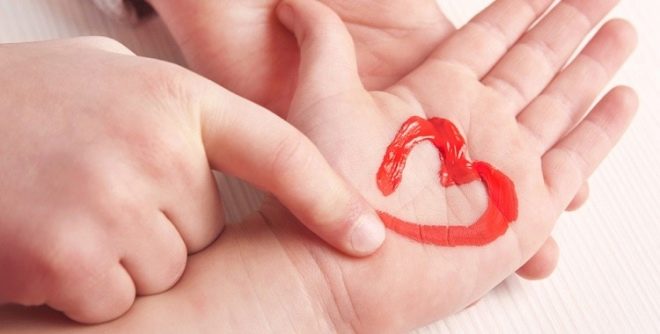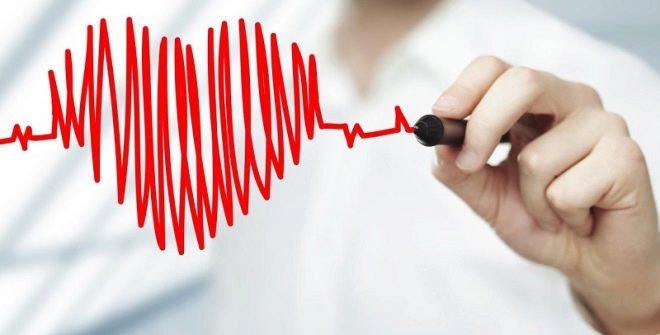Heart problems in children and adults in terms of psychosomatics
Heart diseases take a leading position for the causes of death of adults and children in the world, along with tumor processes. The prevalence of diseases of the cardiovascular system is wide - from congenital heart defects in newborns to acquired diseases in children older and adults. One of the main reasons for the occurrence of such ills is the nervous factor, stress. Read more about the psychosomatic prerequisites for heart disease in this article.
Official look at the heart
"Heart problems" in the medical language means a large group of various pathologies that denote disorders of the functions of the heart. This muscular organ with its contractions provides blood flow through the vessels, and its dysfunction somehow leads to impaired blood circulation. The heart acts as a pump: it pushes the blood through the vessels, so that it goes to all organs and systems of the human body.
From the point of view of traditional medicine, heart diseases can be divided into those that are associated with cardiac rhythm disorders, those associated with the inflammatory process of the membranes of the organ, as well as diseases that occur with disorders of the valves - acquired or congenital. There is also hypertension, which is considered one of the most likely causes of heart problems. There are also acute, urgent conditions - ischemic, associated with the cessation of blood flow to the heart, with its acute oxygen starvation. Separately, there are diseases in which heart failure develops due to vascular lesions of the heart.
Traditionally, answering the question why heart disease has appeared is rather difficult. Medicine treats causes as multifactorial: commonly referred to as obesity, bad habits, exorbitant severe stress. At the same time, it is precisely stress that most specialists assign as crucial.
An explanation of the causes of congenital malformations are still looking for scientists and physicians. There are theories of their connection with sex, with certain violations in the period of intrauterine development, stopping this development at certain periods of embryogenesis, but so far no one has been able to say with certainty why children with congenital heart defects are born.
Psychosomatic approach - common causes
Psychosomatics treats a person not only from a physiological point of view, as medicine, and not only from a metaphysical position, as psychology. She sees it entirely: with body and soul, with all mental and psychological experiences, which often become the root cause of physical illness. In relation to cardiovascular diseases, psychoanalysts were in solidarity at the beginning of the 20th century. Since it was not possible to clearly explain the causes of the same ischemia or hypertension, it was decided to increase the pressure in the so-called Chicago Seven Psychosomatic Diseases, compiled at the University of Chicago Psychoanalysis in 1930. This meant that, for hypertension and ischemic disease, they officially recognized the status of ailments that a person, by and large, creates for himself: with his emotions, thinking model, and behavior.
The heart in psychosomatic medicine means the feeling of love, emotional attachment. At the metaphysical level, it is the ability to receive and give love.The blood that runs through the vessels due to heart muscle contractions is the joy of life. He who loves, whose heart is sufficiently filled with this feeling, lives with joy. It is easy to imagine at the physiological level: there is enough blood in the heart - the heart works as it should, a person is healthy. There was a shortage of blood - there was heart failure.
Researchers in the field of psychosomatic medicine are confident that heart diseases develop when a person consciously or unconsciously rejects love, refuses joy. No wonder, in the people of people who do not like, who are cruel, they say "the heart is like a stone", "stone heart". The psychological portrait of an adult with heart diseases confirms this: people become cruel, callous, indifferent to other people's experiences.
Diseases and their development mechanism
Skeptical readers may wonder how heart diseases develop for a psychosomatic reason. If a person is constantly experiencing stress, negative and destructive emotions (anger, anger, resentment, envy, jealousy), then in his heart less and less space remains for such a natural feeling as love. As a result, at the level of the central nervous system, changes occur in the regulation of the activity of blood vessels and heart valves, clamps, blocks arise, which leads to the development of pathology.
Please note that people who think positively, optimists and those who know how to be sincerely happy suffer much less heart disease than people who are touchy, envious and do not expect anything good from life. Psychosomatic pains in the heart are exacerbated during the period of intense experiences. The stronger the emotion, the greater the likelihood of a heart attack.
Doubters about the close connection between the work of the heart and emotions of a person should be remembered that during periods of excitement, at crucial moments of life, the heartbeat always increases, and when frightened, it “freezes”. Changing the rhythm is not subject to the will of the person, he can not at will to slow down or increase the heart rate.
Heart diseases are most often caused, therefore, by a lack of love, ignoring its value, and the depreciation of this feeling, which is important for a person’s life. Please note that people who don’t attach great value to love issues, but at the same time concentrate all their efforts on achieving career success, making money, die more often from a heart attack than those who pay more attention and importance to the personal sphere of life.
Sometimes people consciously “close” their hearts to new feelings. This is mainly due to the previously unhealthy experience of unsuccessful love relationships. Sooner or later, such people, if they do not change their mind, do not forgive the offender and do not open their hearts to love, develop cardiovascular diseases.
In childhood, acquired heart problems are most often due to increased anxiety: too shy and shy teens with a huge unfulfilled need for love are more likely to suffer from arrhythmias and other disorders of the heart. Children who have experienced a severe lack of love on the part of their parents also risk falling into the number of patients with a cardiologist during puberty.
A big mistake is made by parents, who themselves devalue the concept of love in the eyes of children. Some mothers, whose marriages have broken up, convince daughters and sons that love is “not the main thing, more important is to get a profession, become a man, and then think about love.” Such a setting generates thousands of potential “cores”, which even in adulthood devalue love relationships according to a childlike installation.
The development of acquired heart disease in childhood often occurs against the background of a protracted conflict between two people whom the kid loves most and who should love each other, but for some reason this is denied by their actions - moms and dads. Also at risk are adults and children who are used to holding back emotions that they cannot express, as well as very pitiful people who are said to “take everything to heart”.
Specific diagnoses and conditions also have their own general explanation, although in each case individual work with a person is needed.
- Tachycardia - anger, anxiety, self-doubt, intense excitement over trifles, psychoneurotic state.
- Atherosclerosis - vascular occlusion and high cholesterol are characteristic of people who cannot enjoy life and its trifles, who believe that the world of love is unworthy, that it is bad and unfair.
- Hypertension - the inability to express emotions that accumulate and "put pressure" on the vessels from the inside, repressed aggression.
- Arrhythmia, atrial fibrillation - fears, anxiety, irritability.
- Coronary artery disease - complete blocking of oneself from the sensual sphere, love, denial of it, hatred for someone, long existence under stress, joyless existence.
- Congenital heart disease - The most difficult group, which some researchers associate with a lack of love in the mother during the period of gestation, especially in the early stages. It also exists, but is not statistically proven yet the connection between unwanted children, from which mothers planned to get rid of, having an abortion, in which women doubted their usefulness, and congenital heart defects.
How to treat?
An adult and a child with heart diseases need two specialists - a competent cardiologist and a psychologist (psychotherapist). The first will help to carry out the necessary examinations on time, monitor the physical condition, prescribe procedures, medications, and if necessary, surgical treatment. The second one will help a person to correct psychosomatic “problems”, to reconsider his attitude towards love, life, and himself. An integrated approach will ensure the effectiveness of treatment.
A child and an adult with a sick heart need positive emotions, a feeling of joy, an understanding that they are loved. There are various psychological and psychotherapeutic methods that allow you to “tune” a person to a positive.
In practice, even a puppy or a kitten, which he so wanted to get, can help a child with heart disease, a visit to a circus or a zoo. The more interesting his life will be, the more positive emotions he will receive, the more effective the treatment that the baby receives as part of the official cardiac therapy.
















